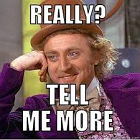Today's new-to-me word was interesting to me in part because of the context in which I found it. I was reading a TPM article about this week's executive order that pertains to social media, and I saw the sentence "Trump revealed the kayfabe of the whole exercise." I wasn't sure I'd seen kayfabe before; it certainly doesn't come up much in my political readings.
The term apparently originated in the world of all-star a.k.a. professional wresting. This is a type of sport—and I suppose that label is questionable—in which the participants seem to be engaged in a contest, but which is more of a performance. An important part of the culture of professional wrestling is that it pretends to be real; to paraphrase a different type of sport, the first rule of the sport of professional wrestling is that everyone pretends it's a real sport.
 This see-through illusion is referred to as kayfabe. As the Wikipedia article on it says, kayfabe is the suspension of disbelief that surrounds all aspects of wrestling, from the actual performances to the personas and supposed rivalries. As near as anyone can tell, the word kayfabe is a Pig Latin version of the word fake, used to (supposedly) hide the word fake from outsiders.
This see-through illusion is referred to as kayfabe. As the Wikipedia article on it says, kayfabe is the suspension of disbelief that surrounds all aspects of wrestling, from the actual performances to the personas and supposed rivalries. As near as anyone can tell, the word kayfabe is a Pig Latin version of the word fake, used to (supposedly) hide the word fake from outsiders.
Back to the TPM article. Here's the full context:
Appearing with Attorney General Bill Barr, Trump revealed the kayfabe of the whole exercise: “If you’re gonna have a guy like this be your judge and jury, I think you shut [Twitter] down, as far as I’m concerned,” he said, referring to Twitter’s fact checks.
I think that the writer is suggesting that the executive order is theater, that everyone—including the participants—knows that this gesture is about playing to the fans. It can be a bit hard to tell, though, in contemporary politics. In professional wrestling, when the match is over, everyone goes home and nothing changes. We'll see about this EO.
Origins question for you: is it weird that the word irony includes iron? Surely the metal can have nothing to do with irony as "conveying the opposite of a literal meaning"?
No, whew. Irony comes originally from Greek eironeía, which means something like "dissimulation"—feigning ignorance. We got the iron-ical spelling from French via Latin, which had pre-borrowed the word from Greek for us.
 The sense of irony as a way of being witty goes all the way back to the Romans. But the original Greek sense wasn't just about saying "I love it when it rains on the day I want to go hiking." For example, Socratic irony is a technique in the Socratic dialogues (I guess?) where someone pretends ignorance not to be funny, but to lure them into showing their ignorance.
The sense of irony as a way of being witty goes all the way back to the Romans. But the original Greek sense wasn't just about saying "I love it when it rains on the day I want to go hiking." For example, Socratic irony is a technique in the Socratic dialogues (I guess?) where someone pretends ignorance not to be funny, but to lure them into showing their ignorance.
I guess I'll note that there actually can be iron in irony, as I learned when I looked up the word; you can use irony to mean "iron-like" or "containing iron." The OED has a cite for this sense from 2009 ("the irony taste of blood"). People do get a little confused at times about what irony means, but I doubt they'd get these two senses mixed up.
Like this? Read all the Friday words.
 |
|

 |
|
